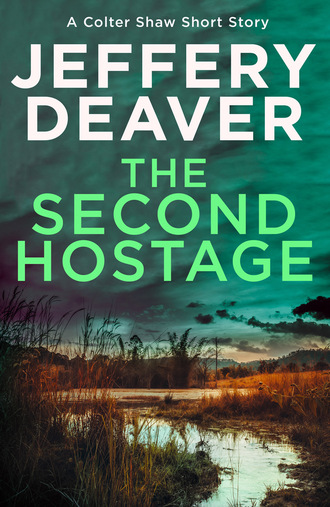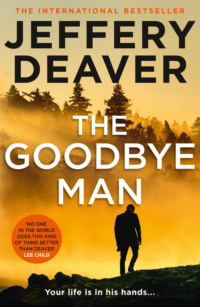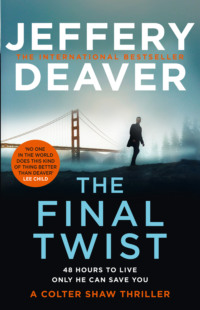
Полная версия
The Second Hostage

THE SECOND HOSTAGE
A Colter Shaw Short Story
Jeffery Deaver

Copyright
HarperCollinsPublishers
1 London Bridge Street
London SE1 9GF
www.harpercollins.co.uk
First published in Great Britain by HarperCollinsPublishers 2020
Copyright © Gunner Publications, LLC 2020
Jeffery Deaver asserts the moral right to be identified as the author of this work
Cover design by Claire Ward © HarperCollinsPublishers Ltd 2020
Cover photographs © Shutterstock.com
A catalogue record for this book is available from the British Library
This is entirely a work of fiction. Any references to real people, living or dead, real events, businesses, organizations and localities are intended only to give the fiction a sense of reality and authenticity. All names, characters and incidents are either the product of the author’s imagination or are used fictitiously, and their resemblance, if any, to real-life counterparts is entirely coincidental.
All rights reserved under International and Pan-American Copyright Conventions. By payment of the required fees, you have been granted the non-exclusive, non-transferable right to access and read the text of this e-book on-screen. No part of this text may be reproduced, transmitted, down-loaded, decompiled, reverse engineered, or stored in or introduced into any information storage and retrieval system, in any form or by any means, whether electronic or mechanical, now known or hereinafter invented, without the express written permission of HarperCollins e-books
Ebook Edition © MARCH 2020 © ISBN: 9780008346904
Version: 2020-02-27
Contents
Cover
Title Page
Copyright
Chapter One
Chapter Two
Chapter Three
Chapter Four
Chapter Five
Chapter Six
Chapter Seven
Chapter Eight
Chapter Nine
Excerpt from The Goodbye Man
Keep Reading …
About the Author
Also by Jeffery Deaver
About the Publisher
One
“Okay. We’ve got a situation.”
The slim, tanned deputy, of upright posture, had just hung up the phone and was addressing the room. “That was Sally, dispatch. There’s a hostage situation and gunshots. Kiowa Lake.”
The half dozen fellow law enforcers, in tan slacks and dark green shirts, were essentially frozen in time, looking his way. Five men and one woman, ages mid-twenties to mid-forties. Four men were white. The other a light-skinned African American. The woman was indigenous.
Their collective expression was one of surprise.
The words hostage situation and gunshots were not uttered here very often, Colter Shaw supposed.
He was sitting across the desk from the man who’d uttered them.
Deputy Peter Ruskin—Shaw pegged him about thirty-five—continued, “One of those vacation houses. Renter said a guy pulls up in a car, wanders around the dock, talking to himself, then pulls a gun and breaks in.”
“Type of weapon?” one deputy, about Ruskin’s age, heavier, asked. H. Garner. The law enforcers all wore name tags. Convenient.
“Unknown. Renter gets into the bathroom, calls nine-one-one. Dispatch heard the door getting kicked in and a voice saying, ‘Get into the living room, sit down. Shut up.’ Phone went dead. Then neighbors called in and said they heard a shot. Wasn’t the hostage got hit, looks like. The taker was aiming out the window.”
The Cimarron County Sheriff’s Department was functional, typical of dozens of public safety offices Shaw had been in. Small too. Their jurisdiction—in south central Kansas—was large geographically but not in population.
“The renter say if he’d recognized him?”
Ruskin said, “It’s a vacation house, Jerry.”
J. Briscoe.
“Oh, right. He’s from out of state.”
“Injuries?” B. Harper asked. The woman. She was short of stature, with broad shoulders. Her stylish glasses bore a faintly blue tint.
“No. Was shooting at a tree, seems. Sally called the sheriff. He’s on his way. Okay, let’s get to it.” Ruskin seemed to have some seniority over the others, even though he was in the middle of the years-on-earth bell curve. He looked over the cramped room. “George, Devon and E.J.’re on patrol. I’ll have dispatch get ’em over. I want some of you with me. Who here’s run a hostage case? Anybody?”
The deputies regarded one another but said nothing.
Colter Shaw said, “I have.”
Two
He’d come to Kansas pursuing a reward.
Colter Shaw’s profession.
A mother in a suburb of Topeka was offering $3K to locate her runaway daughter. The small amount—and the fact the young woman was nineteen—had generated little interest among rewards seekers. Kids who take off from home? Tracking them was usually more trouble than they were worth.
Emma Cummings had come home from college, and a day or two later Mom had found some drugs in her jeans pocket. Not much, but enough to create a domestic explosion. The don’t-I-have-any-privacy side battling the I-was-only-doing-your-laundry-thank-you-very-much side. The next morning Emma had split, taking her backpack and computer.
After several fretful days, Emma’s mom had scraped together what cash she could and posted the reward announcement on the internet. Shaw’s associates in Florida, who scanned the web regularly for offers, sent the info his way, knowing his soft spot for runaways. He’d piloted his Winnebago to Kansas and met with Mom.
Shaw always approached domestics warily. Sometimes you could put the disappearance down to impulsive youth. Sometimes the kids ran for a reason, in which case Shaw chose not to continue or, upon finding the kid, went to the authorities. But in the Cummings household, he spotted no abuse, just an overly protective mother with a churchgoing, conservative background, shocked about a baggie in Emma’s Levi’s. For her part, it seemed, Emma had just broken up with her boyfriend the day she’d left for home. Bad moods all around would have been a factor, as were issues about her parents’ recent divorce, Shaw was sure.
One aspect of the job was unique; the mother didn’t actually want him to report Emma’s location. He was to make a delivery. The business-sized envelope contained not only a letter but a lump. A charm or a necklace? Shaw wondered. A silly toy?
She’d preempted his next question: “I trust you. Come back and tell me you’ve delivered it. I’ll give you the check.”
His search had begun, interviewing Emma’s friends. It had gone smoothly up to a point. A lead sent him to Prescott, Kansas, thirty miles away, where one of Emma’s high school classmates lived. Emma had spent the night with her. The teen had been willing to talk to Shaw; she’d thought the mother-daughter fight was “stupid” and encouraged Emma to return home. But, no, she had continued southwest into the hinterland. The only clue: Emma was planning to stop at a renowned fried chicken place in Humble, Kansas. That was all she knew.
So on to the curiously named burg, population eight thousand.
Downtown Humble was exactly what one would expect: a diorama of 1950s Middle America. In late July, the streets had a dusty feel. Shaw had the chance to buy plenty of souvenirs bearing the town’s name, which he declined, to sample the Southern-fried chicken, which he indulged in. It was the best he’d ever eaten. The establishment was Ling Yu’s Chicken Shack, whose name initially seemed to require an explanation. Then Shaw reflected: But why? He ordered seconds.
He displayed Emma’s picture to the owner and the servers. One waitress vaguely remembered the young woman, but couldn’t help with later destinations. She’d been quiet while she’d eaten, texting the entire time. It was moments like these that Shaw regretting not having a law enforcement agency behind him, and the magic bullet of a warrant to get his hands on texts.
Where had she gone after Humble?
The trail didn’t exactly end; it diverged: in the middle of the town was a roundabout with four roads branching off in different directions.
Colter Shaw had a vast collection of Rand McNally maps, and as he ate he studied Kansas. Two of the routes would have taken Emma to even more remote parts of the state—and places beyond. A third was the paved version of the old Dodge City Turnpike—a covered wagon route. The last of them would have taken her directly to I-35. This latter would have been unfortunate from Shaw’s point of view, as it was a major north–south thoroughfare, from which she could access thousands of destinations from Mexico to Canada.
So, Emma, Shaw thought, finishing the not-terrible coffee, which was it?
Or had you turned around and headed back in the direction of home via the route on which you’d come after finishing Luncheon Special 2, half chicken, slaw and biscuit?
He had then glanced out the window of the restaurant.
Oh.
There’s an idea.
Shortly thereafter, Shaw was sitting in the Cimarron County Sheriff’s Department, a five-minute walk from Ling Yu’s. Deputy P. Ruskin was cautiously happy to hear him out.
“The traffic cam, hmm?” the man asked.
The “idea” had been viewing the video from a camera that looked down over the intersection.
“Rewards?” asked another deputy. He had massive biceps and forearms, and his name tag read T. THORNTON. He was laughing. “Can’t be your job.”
“It is.”
“You make a living at it?”
Of sorts.
“I do.”
He would hardly explain that rewards-seeking, for him, wasn’t exactly about the money. It was that a reward represented a puzzle that no one else had been able to solve. Growing up among the three Shaw siblings, Colter was known as the “restless one.” Restless in body, also restless in mind. Traveling around the country untying Gordian knots was the perfect vocation for him.
“Not a bounty hunter, bond enforcement agent?” Ruskin asked.
“Nope. Not a private investigator either. I’m not licensed.”
“Would you be armed?”
“There’re two handguns in my camper, yes. I have a conceal carry permit. It’s valid here.”
No one in the room gave any reaction. You’d think police might be concerned about the number of citizens toting guns in pockets and hidden holsters. Not the case. What the cops knew was that in order to get a CCP, you needed to pass a comprehensive criminal and mental health background check.
Ruskin seemed sympathetic, but rules, apparently, were not to be breached in Humble. “I’m sorry, sir. Can’t help you. Maybe if you contacted a law enforcement agency in Topeka, they could come to us. And we’d see what we could do.”
Shaw sighed. Out the window, he could see the camera, lording over the intersection like a UFO. He was trying to think of some way to persuade Ruskin to help, when the deputy’s phone had rung.
He answered and said, “Hey, Sal.” Then, frowning, he had a conversation.
After he hung up, he looked over at the other deputies in the office, and said, “Okay. We’ve got a situation.”
Конец ознакомительного фрагмента.
Текст предоставлен ООО «ЛитРес».
Прочитайте эту книгу целиком, купив полную легальную версию на ЛитРес.
Безопасно оплатить книгу можно банковской картой Visa, MasterCard, Maestro, со счета мобильного телефона, с платежного терминала, в салоне МТС или Связной, через PayPal, WebMoney, Яндекс.Деньги, QIWI Кошелек, бонусными картами или другим удобным Вам способом.



